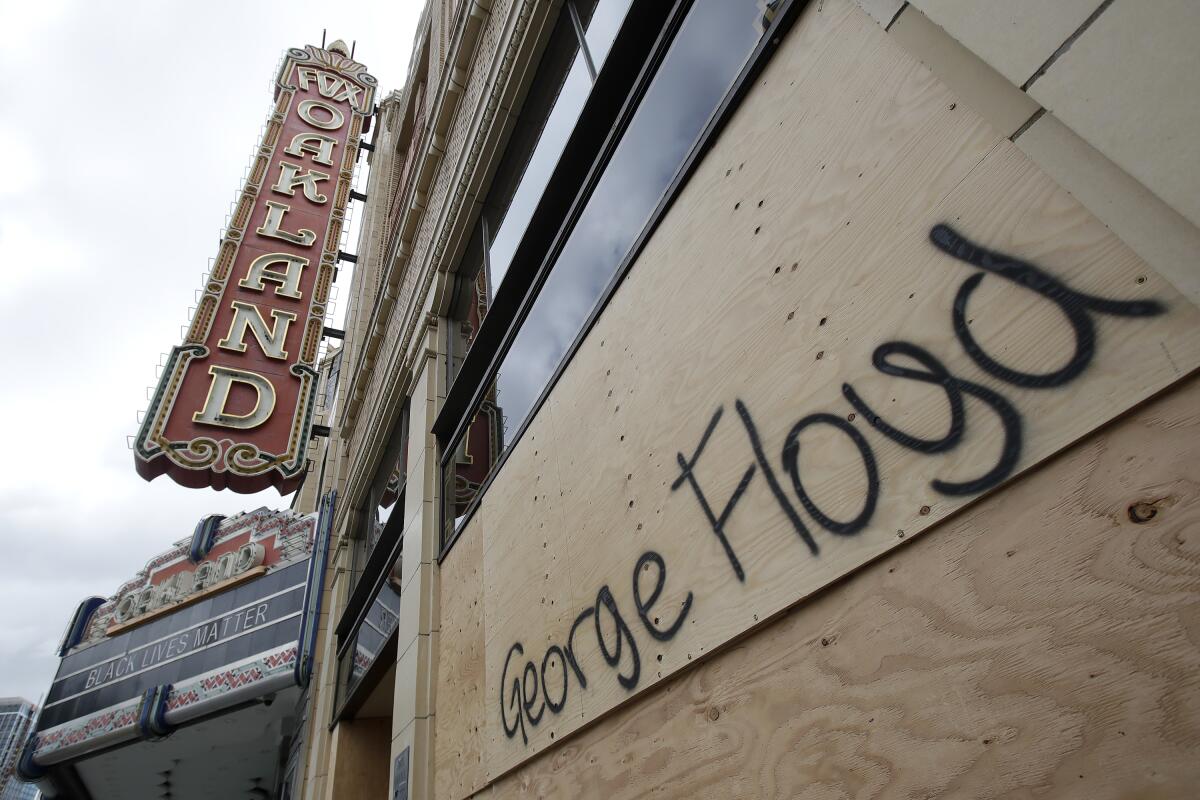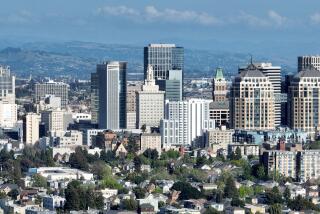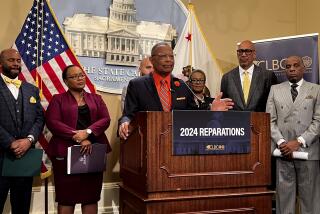Column: Protests and ‘looting’ seem to be the only way Black-owned businesses can get help

- Share via
Elisse Douglass knew she had to do something.
Almost two weeks ago, she took a walk over to Broadway in rapidly gentrifying downtown Oakland and started counting the many Black-owned businesses that had been damaged after a peaceful protest for George Floyd turned into something very different.
Windows and glass display cases were shattered. Merchandise had been ripped off. Graffiti was everywhere.
“My real estate brain was kind of like, small businesses are struggling,” said the 32-year-old Douglass, who is Black and spends her days working with small retailers trying to reopen after the coronavirus outbreak. “These extra costs are going to be hard for people to handle right now.”
Indeed, a recent study from the National Bureau of Economic Research found that Black-owned businesses were hurt the most by the shutdown, with 41% of them closing permanently between February and April. What’s more, 95% of Black-owned businesses are sole proprietorships, making them ineligible for many federal relief programs.
Given this, it might be tempting for some to buy into the narrative that the protests have only made matters worse —that taking to the streets has merely been a self-defeating exercise of (supposedly) Black people destroying the Black economy in the name of Black lives.
President Trump has certainly insinuated as much by tweeting about “looting” and “law and order.”
None of this is true.
The economic pain from the coronavirus has been deep. But it’s the righteousness of the protests, including the few that turned violent, that seems to have galvanized the broader American public to support Black-owned businesses in way so dramatic that I’m fairly certain it wouldn’t have happened otherwise.
Apparently, there’s nothing like a smashed window and graffiti to clearly convey the need for help.
It’s help, quite frankly, that has been needed for decades. It’s just that the recent unrest has shined a light on entrenched discriminatory practices, including access to capital, that have kept Black business owners on unequal footing with their white counterparts and widened the wealth gap.
So now sales are up, as lists of Black-owned businesses have continued to circulate on social media. And far more than the usual suspects have shown up to donate to relief efforts.
Perhaps nowhere in California is this more the case than in Oakland, where the owners of Queen Hippie Gypsy have experienced it all firsthand.
As people gathered the last Friday of May, Lilliana Ayers and her husband, Kyrah, decided against boarding up their shop on 14th Street near Broadway, wanting it to be a “light for the movement.” The next morning, they found the window smashed in, right over an image of Tommie Smith holding a gloved fist aloft in a Black power salute during the 1968 Summer Olympics in Mexico City. Lilliana, like almost everyone I spoke to in Oakland, insisted that the people who trashed her business had nothing to do with the Black Lives Matter movement.
Queen Hippie Gypsy had been doing well before the coronavirus outbreak. And now, with people perhaps moved by photos of the damage on Instagram, online sales of healing crystals and yoga apparel have been climbing steadily, particularly among new customers.
“We’ve seen people from every race, religion,” Lilliana said.
After seeing the destruction along Broadway, Douglass was so overwhelmed with the desire to do something that she started a GoFundMe campaign. A relative newbie to such activism in a city with a long and proud history of it, she had expected to raise a mere $5,000. But in a matter of days, the campaign went viral and she had raised more than $100,000 for Black-owned businesses desperate to clean up what vandals had left.
“It really started as just a personal effort,” Douglass said. “I’m actually really overwhelmed by the response.”
Meanwhile, Oakland’s African American Chamber of Commerce had already been raising money to help Black-owned businesses recover from the shutdown to slow the spread of the coronavirus — one that, if you’ll recall, was longer in the Bay Area than in Los Angeles.
Now that pot of money — to be doled out in grants ranging from $5,000 to $100,000 to recipients who agree to take business management training — also will be used to help fix damage from the protests.
Cathy Adams, the chamber’s president and CEO, said she was well on her way to reaching a goal of $1 million, and now is working connections with corporations and friends with celebrity friends to raise more money.
“This is what coming together looks like,” Adams said. “Where Black-owned businesses might have seemed invisible before, people are showing up from everywhere.”
The question, of course, is, will this last? Not just in Oakland but across California. Once the news cycle moves away from getting justice for George Floyd and defunding police departments over the seemingly endless scourge of brutality and systemic racism, will Black-owned businesses fall back into relative obscurity?
Adams is optimistic that won’t happen.
She told me about conversations she’d had with bank executives, who have pledged to reexamine their lending practices, which too often leave out would-be business owners who are Black who then have to cobble together start-up money from friends and family.
“I think we’re going to see a change,” Adams said. “White people will continue to invest in our businesses.”
Douglass is optimistic, too.
Beyond raising money from the masses, she has managed to help create new networks of people who want to help. She started a database so people could offer their services as volunteers. One popular request has been for marketing and advertising, as business owners try to lure old customers back and keep new ones.
Other connections have been more direct, with Black people helping Black people — artists, for example, who have painted murals on the plywood covering the doors and windows of businesses. Then there was the owner of a wig store in east Oakland who had extra inventory that she needed to donate as she worked to clean up after being ransacked. Douglass reached out to her burgeoning network and helped connect the owner with the operator of a transitional housing facility for Black women.
“It really speaks to the power of the Black community,” she said, “and why we do this work in the first place so they can continue to be the infrastructure for our culture.”
Still Douglass harbors no illusions of the hard road ahead for Black-owned small businesses and for Black people, in general, who continue to lag white people when it comes to both income and wealth.
“It’s easier to fix windows than to fix a system built on racism.”
More to Read
Sign up for Essential California
The most important California stories and recommendations in your inbox every morning.
You may occasionally receive promotional content from the Los Angeles Times.














